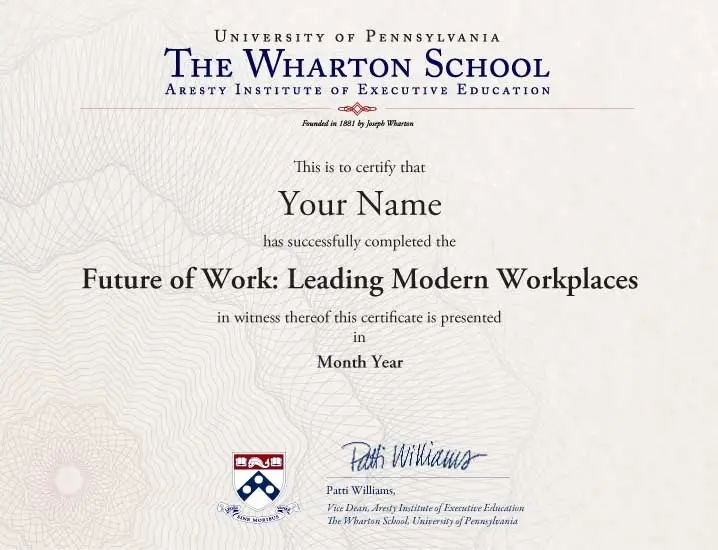Future of Work: Leading Modern Workplaces
Key Takeaways
Wharton’s Future of Work program is designed to provide senior business leaders and HR professionals with a reliable framework to successfully navigate changes in modern workplaces. This program will enable you to:
Discover trends at the workplace and in the labor market that you may be overlooking
Analyze the eight forces affecting the current state of work and forecast their potential impact on your organization
Conceptualize your existing or forthcoming strategies to harness the talents of a global and mobile workforce
Consider how to view immigration as a business strategy and not simply as a political topic
Identify the pitfalls, challenges, and emerging solutions for putting AI into practice
Program Modules
This program has been designed to provide senior leaders and HR professionals with the necessary understanding of the realities of today’s workplaces. The program addresses the factors that impact the labor market and paints a broad picture of the technological and social changes that are causing the workplace revolution.
Trends in the Future of Work - Final Project Proposal
In the final project you will develop a proposal to reimagine the current state of work in your organization based on an identified opportunity for improvement through the lens of one of the eight major forces discussed in the program. This project will help summarize the course learnings in a practical, specific manner, allowing you to walk away with a tangible plan to present to your colleagues/organization.
Program Experience

LIVE OFFICE HOURS

FIRESIDE CHAT

INDUSTRY EXAMPLES

ASSIGNMENTS

POLLS

REFLECTIONS

DISCUSSION BOARDS
Faculty

Professor of Management, the Wharton School
Lindsey D. Cameron researches how changes in the modern employment landscape including variable pay, short-term job contracts, and machine learning are affecting work and work...

Max and Bernice Garchik Family Presidential Associate Professor of Management, the Wharton School
Exequiel (Zeke) Hernandez studies the globalization, innovation, and performance of firms. His research interests include global networks, immigration, mergers and acquisition...

Associate Professor of Operations, Information and Decisions, the Wharton School
Prasanna (Sonny) Tambe researches the use of data science and AI for human resources applications, as well as the economics of labor markets for high-tech workers. His publish...

Assistant Professor of Management, , the Wharton School
Lindsey D. Cameron researches how changes in the modern employment landscape including variable pay, short-term job contracts, and machine learning are affecting work and work...

Certificate
Upon successful completion of the program, you will earn a digital certificate of completion from the Wharton School.
Note: After successful completion of the online program, your verified digital certificate will be emailed to you in the name you used when registering for the program. All certificate images are for illustrative purposes only and may be subject to change at the discretion of the Wharton School.
This online certificate program does not grant academic credit or a degree from the Wharton School of the University of Pennsylvania.
Explore other recommended programs from Wharton Executive Education
HR Management and Analytics
2 Months, Online
Combine theory with practical application to get a holistic view of strategic HR management that also includes an overview of people analytics.
Mastering Talent Management: Hiring, Engaging, and Rewarding A+ Talent
6 Weeks, Online
Gain the knowledge you need to hire and nurture top talent. Understand tried-and-true strategies you can use to stay ahead of the curve.
Executive Compensation: Strategies and Frameworks
6 Weeks, Online
Gain a deeper understanding of the executive compensation planning process in the context of today’s business environment and in anticipation of tomorrow’s challenges.
FAQs
Didn't find what you were looking for? Write to us at learner.success@emeritus.org or Schedule a call with one of our Academic Advisors or call us at +1 680 205 5118 (US) / +44 185 845 9995 (UK) / +65 3135 1422 (SG)
Early registrations are encouraged. Seats fill up quickly!
Flexible payment options available.
Starts On







